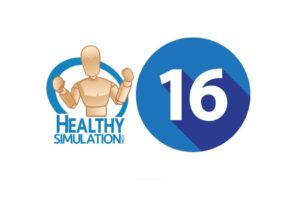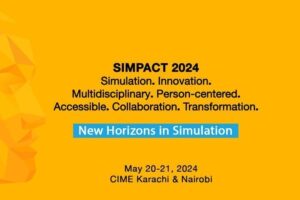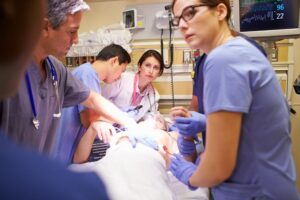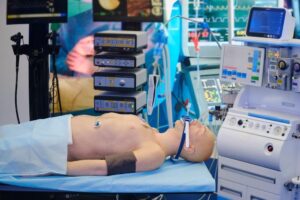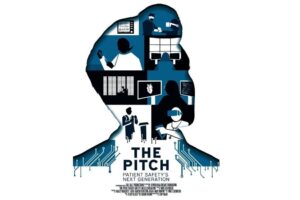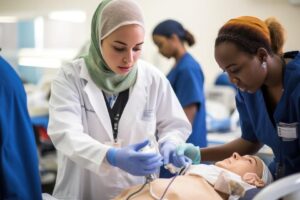Global Clinical Simulation News Updates From August 2023
Helping healthcare simulation educators, administrators, and learners to stay up-to-date on industry topics, HealthySimulation.com finds and shares relevant news and information from around the world. This news includes clinical simulation learning opportunities, funding updates, acquisition information, innovation progress, and more. Together, these industry updates help paint a picture of where the healthcare simulation industry is presently, and where the industry is headed as the scope of clinical simulation practice expands. Below are some of the world’s latest clinical simulation updates from August of 2023.
New SCDF Facilities Where Firefighters Train To Battle Large Fires, Medical Responders Learn With VR SINGAPORE – The Singapore Civil Defence Force’s (SCDF) upgraded Civil Defence Academy (CDA) will not only prepare SCDF officers for evolving threats, but also allow them to scale their capabilities in future. Home Affairs Minister K. Shanmugam officially opened new facilities such as the Fire Research Centre (FRC) and the National Emergency Medical Services Training Centre (NETC) at the annual SCDF workplan seminar on Monday. “SCDF has made significant progress towards being a world-leading life-saving force. Singapore is one of the safest places in the world, in the context of civil and medical emergencies.”
Intelligent Ultrasound Works with Pleural Disease Experts to Increase Respiratory Training Opportunities and Patient Safety : Intelligent Ultrasound (IU) has worked with pleural disease experts to increase respiratory training opportunities and in turn patient safety. The nine new types of pathology, due for release on BodyWorks Eve in September, will provide trainees with a structured approach to learning and access to different pathologies ‘on demand’. Dr Andrew Stanton and Dr Duneesha de Fonseka, consultant respiratory physicians, with specific expertise in pleural disease have provided expert advice and guidance for this new initiative. Both have been closely involved in British Thoracic Society Training Standards and Guidelines in this area. The BTS Training Standards for Thoracic Ultrasound1 (TUS) recognize the role simulation can play to support ultrasound training for clinicians in the UK.
Sponsored Content:
3B Scientific Acquires Lifecast Body Simulation 3B Scientific, a leading manufacturer and marketer of medical simulation products and anatomical models for healthcare education, announces today that it has reached an agreement to acquire Lifecast Body Simulation. Launched in 2017, Lifecast has developed a range of highly accurate and lifelike medical manikins which are transforming the way medical simulation and education are delivered and absorbed. Designed and produced at the renowned Elstree Film Studios in London and in Sarasota, Florida, every manikin demonstrates a remarkable level of realism and the very highest quality. Todd A. Murray, CEO, 3B Scientific, commented: “Lifecast Body Simulation is a globally recognised brand, respected for their hyper-realistic, diverse manikins, and track record of constant innovation. We are extremely excited to welcome Lifecast into the 3B Scientific family, where combined with our strength in manufacturing and distribution, we look forward to continuing our collective mission of advancing the delivery of medical and healthcare education worldwide.”
New Simulator for Wound Packaging Simulator for training in wound packing to control hemorrhage from stab wounds. Enhance prehospital care education through hands-on training with bleeding control instructions for wound cavity filling. This simulator is especially suitable for training in Tactical Combat Casualty Care (TCCC) and civilian casualties (Stop The Bleed). Instructor Controlled Bleeding: Bleeding from the wound is controlled by a manual blood pump system that simulates deep bleeding. Includes transport case, 1 31gr sachet of powdered blood without coagulant, intravenous system with bottle and 1 sample X8T tourniquet. Reusable for numerous occasions. Easy to store, wash and preserve.
GigXR and DICOM Director Debut Three-Dimensional Medical Imagery Learning Using Holograms of CT Scans and MRIs Los Angeles, CA and New Haven, CT – August 3, 2023 – GigXR, Inc, whose immersive learning platform delivers a catalog of complementary XR applications for healthcare training, announced today the debut of DICOM XR Library powered by INTRAVISION XR. The new application renders a complete set of hyper-realistic 3D medical imagery derived from MRI and CT scans for use in teaching, training, and simulation. This empowers nursing and medical schools, hospitals, and the Department of Defense with the all-new ability to leverage holographic medical imagery in anatomy and pathophysiology curricula. “As a surgical oncologist for 25 years, I relied on imaging to perform complex surgeries. I also saw firsthand the need for better imaging technology,” said David Pearlstone, MD, CEO at DICOM Director. “In the operating room, I was guided by what was essentially a picture taped to a light during a six-plus-hour liver resection. By partnering with GigXR, we are ensuring that tomorrow’s medical professionals will work from more detailed, sophisticated content from day one.”
Bristol-based Limbs & Things delivers new training product to make assisted births safer Bristol-based medical simulator company, Limbs & Things, has released a new product to help medical trainees practice assisted deliveries of babies, as assisted deliveries continue to increase globally. Limbs & Things has worked closely with medical professionals at the PROMPT Foundation, Southmead Hospital, in Bristol and other key opinion leaders to develop the new Assisted Vaginal Birth (AVB) Module, which trains clinicians to use instruments that aid the delivery of a baby. This is a key skill for all specialist obstetrics and gynaecology trainees in the UK and USA. The AVB Module works with Limbs & Things’ world-leading PROMPT Flex birthing simulator to help trainee medical professionals learn correct techniques and use of instruments to deliver a baby safely, with minimal risk to mother and baby.
Sponsored Content:
Latest News from the Gordon Center 🙌 Summer Edition The Gordon Center thrives on partnerships. Over the past four decades, our collaborations have expanded across Florida, the U.S., and the world. These partnerships have been instrumental in carrying out our mission to advance healthcare education and save lives through simulation technology. Today, I want to share some noteworthy collaborations that have shaped the Gordon Center’s journey and made a lasting impact. One significant partnership is with the American Heart Association (AHA). Together, we launched the Advanced Stroke Life Support® (ASLS) Blended Learning curriculum, aiming to reduce deaths and disability for stroke victims. Now the ASLS Blended Learning program has successfully launched internationally, building a global network of dedicated providers who are passionate about improving stroke care. During our recent visit to Delhi, India, we introduced both the ASLS Blended Learning course and our Improving Simulation Instructional Methods (iSIM) course, in an effort to continue revolutionizing healthcare education in that country and worldwide.
The Effect of Simulated Patient Death on Learner’s Stress and Knowledge Retention: A Systematic Review and Meta-Analysis of Randomized Controlled Trials Making the simulated patient die is one of the controversial decisions in healthcare simulation. Some experts believe that we should never make the manikin die as they believe the facilitator is deceiving the learners, whereas other groups of experts believe that there are advantages in making the simulated patient die as it provides a valuable learning experience to the learners, and it is as close to reality as possible. Hence, we undertook this review to know whether simulated patient mortality benefits the learners. Simulated mortality can be used as an effective stressor for increasing knowledge retention during the debriefing phase for select students by a skilled debriefer. This study would aid the simulation policymakers, simulation faculties, and simulation researchers in the impact of simulated patient death and learners’ stress response. If the simulation scenario is designed well with robust pre-briefing, this increased stress response can enhance learning and knowledge retention during debriefing.
VR Experts Join Forces To Create Groundbreaking Health Training A Welsh virtual reality company has teamed up with Swansea University and Hywel Dda University Health Board to deliver pioneering healthcare training. The University and the health board have selected Rescape, a Cardiff-based company, to deliver a series of bespoke VR training modules in both English and Welsh as part of £900,000 Higher Education Funding Council of Wales project Virtual Reality a Welsh Reality The project places Swansea University, its partners and Wales at the cutting edge of new technologies to deliver solutions that make the NHS safer, utilise resources more effectively, support flexible and innovative training as well as making strides towards net zero. Rescape is also working with Swansea-based Imersifi, alumni of Swansea University’s Virtual Reality MSc, to support delivery of the project. Head of Simulation, Associate Professor Joanne Davies, is the principle investigator of the VRWR project and leads SUSIM, the University’s specialist centre and programme to develop groundbreaking simulation and immersive education.
Bethel’s New Post-Baccalaureate Nursing Lab Brings Key Training Space for Aspiring Nurses Walking into Bethel’s new Post-Baccalaureate Nursing Lab, you might think you’re in a clinic or hospital. Lifelike manikins recline in hospital beds in the main skills lab with traditional hospital curtains, wall ports for oxygen, and bedside tables while the simulation room almost perfectly replicates a hospital room. Though no patients will receive care here, the labs are designed to be realistic to give aspiring nurses hands-on experience in everything from changing a dressing or hanging an IV to selecting supplies. “Skills intensives and simulation labs create a space where we can practice and perfect skills before we use them in the clinical setting,” says Sydney Gordon CAPS’24. “It is a space where often we make mistakes but try and learn from them.”
A Simple Massive Haemorrhage Protocol Simulation Using Two Dialysis Bags Facilitation of a Massive Haemorrhage Protocol (MHP) is complex, requiring timely co-ordination between hospital teams. Multiple MHP simulations described [1] involve trauma or obstetric patients requiring additional complex actions besides circulatory support. Our experience is that while this is conceptually realistic, there is an inherent distraction from MHP learning when competing trauma-related tasks such as airway protection or chest drains demand participants’ attention during the simulation. This risks cursory rehearsal of MHP, potentially even creating the illusion that MHP has been rehearsed when in fact participants have been focussed on other tasks entirely. In order to empower teams to rehearse the complex skills required for MHP without distraction we created a simple MHP simulation harnessing principles of cognitive load theory.
More About HealthySimulation.com
HealthySimulation.com is the world’s premier Healthcare Simulation resource website, providing the latest news, CE/CME webinars and courses, conference coverage, research highlights, helpful guides, job listings, product demos, vendor connection services, community sharing, and more!
Started in 2010 by Lance Baily, the resource has provided well over 2,000,000 page views of medical simulation-specific content through thousands of daily articles to hundreds of thousands of healthcare professionals from around the globe. The HealthySimulation.com writing team has shared their passion for simulation in healthcare by writing over 4,000 articles so far!
HealthySimulation.com loves supporting healthcare professionals utilizing healthcare simulation to improve educational, training, and patient safety outcomes — and at no cost to readers! As an industry resource, the platform simply asks that readers consider sharing HealthySimulation.com links across their own social media accounts to generate a greater awareness regarding the field of clinical simulation. Questions? Email support@healthysimulation.com.
Subscribe for More of the Best Medical Simulation Updates!
Lance Baily, BA, EMT-B, is the Founder & CEO of HealthySimulation.com, which he started while serving as the Director of the Nevada System of Higher Education’s Clinical Simulation Center of Las Vegas back in 2010. Lance is also the Founder and acting Advisor to the Board of SimGHOSTS.org, the world’s only non-profit organization dedicated to supporting professionals operating healthcare simulation technologies. His co-edited Book: “Comprehensive Healthcare Simulation: Operations, Technology, and Innovative Practice” is cited as a key source for professional certification in the industry. Lance’s background also includes serving as a Simulation Technology Specialist for the LA Community College District, EMS fire fighting, Hollywood movie production, rescue diving, and global travel. He and his wife Abigail Baily, PhD live in Las Vegas, Nevada with their two amazing daughters.
Sponsored Content:








